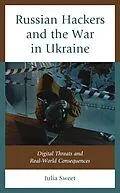Since the beginning of the Russian aggression in Ukraine (February 2022), hackers have become more active on a global scale. The clashes between Russian and Ukrainian "cyber armies" are at its central front line. Russian Hackers and the War in Ukraine: Digital Threats and Real-World Consequences scrutinizes the unique situation where cyber criminals, who usually operate clandestinely, have surfaced and looked for public attention and approval. This book does not cover technical aspects of hacking. Instead, it scrutinizes the public activity of Russian hacker groups including building their brand, communicating with supporters, their financial situation, and other crucial aspects. This research draws mainly on open sources such as social media entries comprised of texts, videos, images, and chat comments which were collected through daily monitoring of the hacking groups' activities.
Autorentext
Julia Sweet received her PhD in global affairs from Rutgers University, NJ. She has published several articles and repeatedly participated in conferences, presenting research about disinformation, fake news, social movements, terrorist marketing strategies, the financing of terrorism, and cybercrime. Her research was supported by the Jordan Center, NYU, and the Davis Center for Russian and Eurasian Studies, Harvard University. In 2014-2023, she created numerous reports on nationalist and extremist organizations circulated in Russian and European cyberspace, many of which prepared or committed terrible terrorist attacks in Europe, the United States, the Middle East, Russia, and other states.
